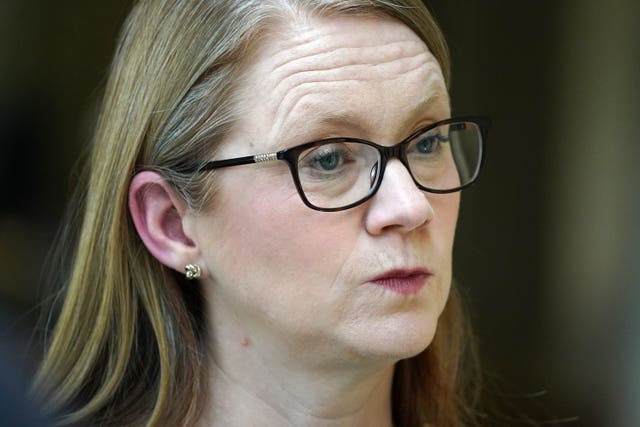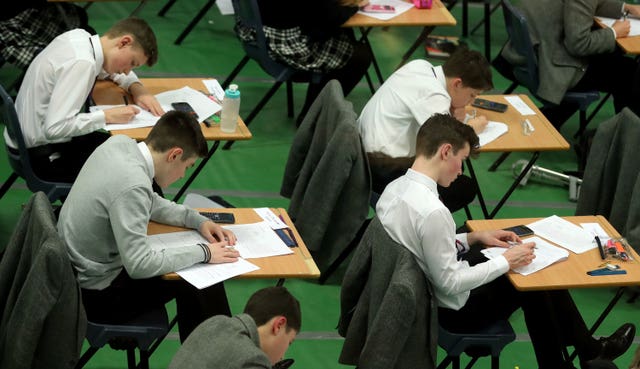
Teachers in Scotland are set to strike for the final time as part of their recent campaign of walkouts – but more action is on the horizon with no new pay offer from Holyrood.
Members of the Educational Institute of Scotland (EIS) union in Inverclyde and Shetland will take to the picket lines on Monday, with most primary and secondary schools set to be shut.
Teaching unions have demanded a 10% pay rise for their members, but the Scottish Government has ruled this out as unaffordable and have offered a 5% salary increase.
 Members of the Educational Institute of Scotland have been striking in their battle for higher pay (Jane Barlow/PA)
Members of the Educational Institute of Scotland have been striking in their battle for higher pay (Jane Barlow/PA)
The 16-day wave of walkouts, which have affected schoolchildren the length of Scotland, has not seen Education Secretary Shirley-Anne Somerville and local authorities buckle, and the unions have warned industrial action would continue.
READ MORE: EIS announce 22 more days of school strike action
Without a deal, strikes could continue into the exam period in the spring. This would mark the third exam period out of the last four years to be hit with disruption after the impact of Covid-19 in 2020 and 2021.
The EIS has already announced two days of national strikes, on February 28 and March 1, followed by another wave of rolling strikes between March 13 and April 21.
On Sunday, Ms Somerville, who said Holyrood and teaching unions were still “some way apart”, told the BBC it was for the teaching unions to suspend strikes ahead of the exam period to ensure there is no disruption.
 Education Secretary Shirley-Anne Somerville said the Scottish Government along with local councils and teaching unions were still ‘some way apart’ (Andrew Milligan/PA)
Education Secretary Shirley-Anne Somerville said the Scottish Government along with local councils and teaching unions were still ‘some way apart’ (Andrew Milligan/PA)
“One of the aspects which I’m very, very determined to ensure is that children and young people have very limited disruption to their education going forward – exams is a critical part of that,” she said.
“I would hope that everyone involved in this dispute would be able to agree that we do not want to see exams disrupted.”
The minister added she was “absolutely” doing everything she could to end the dispute.
READ MORE: Half a million walk out in biggest action in decades
But Des Morris, the salaries convener for the EIS teaching union, said there had been little movement from the Government and councils since the 5% pay offer was made.
He said it was “becoming increasingly difficult” to reconcile public statements from ministers with what is happening in negotiations.
 Strikes could continue into the exam period in the spring (Gareth Fuller/PA)
Strikes could continue into the exam period in the spring (Gareth Fuller/PA)
“Over the course of January we’ve heard a number of statements such as ‘no stone being left unturned’ to find a resolution, offering to ‘look at all options’, statements that ‘there have to be compromises on both sides’, that the Scottish Government is not ‘digging in its heels’,” he told the same programme.
“But these statements have all culminated in our January 20 pay meeting – the last pay meeting that was held – when basically the message was: ‘Teachers, see that 5% offer we offered you six months ago? Take it or leave it’
“If that’s not digging your heels in, then I really don’t know what is.”
Mr Morris added that there had been a “complete lack of urgency” from the Scottish Government and council umbrella body Cosla.
On the issue of exams, Mr Morris said it was not for him to say if there would be strikes that would affect pupils, adding that the EIS executive committee keeps its industrial action plans “under constant review”.



Why are you making commenting on The Herald only available to subscribers?
It should have been a safe space for informed debate, somewhere for readers to discuss issues around the biggest stories of the day, but all too often the below the line comments on most websites have become bogged down by off-topic discussions and abuse.
heraldscotland.com is tackling this problem by allowing only subscribers to comment.
We are doing this to improve the experience for our loyal readers and we believe it will reduce the ability of trolls and troublemakers, who occasionally find their way onto our site, to abuse our journalists and readers. We also hope it will help the comments section fulfil its promise as a part of Scotland's conversation with itself.
We are lucky at The Herald. We are read by an informed, educated readership who can add their knowledge and insights to our stories.
That is invaluable.
We are making the subscriber-only change to support our valued readers, who tell us they don't want the site cluttered up with irrelevant comments, untruths and abuse.
In the past, the journalist’s job was to collect and distribute information to the audience. Technology means that readers can shape a discussion. We look forward to hearing from you on heraldscotland.com
Comments & Moderation
Readers’ comments: You are personally liable for the content of any comments you upload to this website, so please act responsibly. We do not pre-moderate or monitor readers’ comments appearing on our websites, but we do post-moderate in response to complaints we receive or otherwise when a potential problem comes to our attention. You can make a complaint by using the ‘report this post’ link . We may then apply our discretion under the user terms to amend or delete comments.
Post moderation is undertaken full-time 9am-6pm on weekdays, and on a part-time basis outwith those hours.
Read the rules hereLast Updated:
Report this comment Cancel